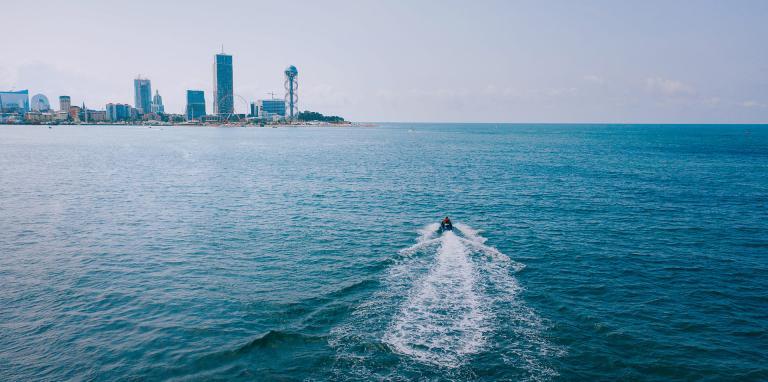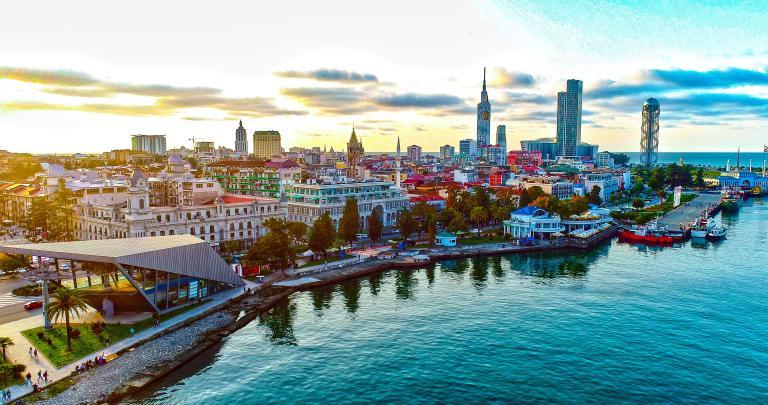
Technical Group on Coastal and Maritime Tourism
Unlocking sustainable tourism potential of the Black Sea

Maritime and coastal tourism is a key blue economy sector in the Black Sea, closely linked to fisheries, maritime transport, ports, energy, aquaculture, cultural heritage, and blue biotechnologies. While it offers significant economic potential, it also faces and poses environmental, social, and economic challenges.
Building on opportunities
The Black Sea is emerging as a prime destination for sustainable tourism, boasting rich natural resources and diverse opportunities. Over the past decade, the region’s tourism sector has grown by an average of 6% annually, accounting for nearly 9% of global tourist arrivals and 19% of Europe’s before the disruptions caused by COVID-19 and Russia’s aggression in Ukraine. This increase highlights the sector’s potential to drive innovation, job creation, and economic development. Key focus areas include expanding aquatic sports and niche tourism to attract younger, international audiences while supporting local entrepreneurship and sustainability. Cultural heritage and maritime routes, such as EuroVelo and Black Sea maritime trails, offer opportunities to strengthen connectivity and showcase underwater cultural heritage. Enhancing synergies between inland, coastal, and maritime tourism can help diversify offerings and promote balanced regional development.
Recognising restraints
Despite its growth, blue tourism in the Black Sea remains constrained by structural challenges. Coastal tourism is heavily concentrated in a few hotspots, leading to over-commercialization, environmental degradation, and restricted public access. The environmental impact of overfishing, pollution—including damage from ongoing conflicts—and habitat destruction further threatens marine ecosystems. A dominant mass tourism model limits sustainability and stifles innovation, while a skills gap among local communities and stakeholders hinders the adoption of sustainable practices and future development in the sector.
Directing the spotlight on cultural heritage
The Black Sea’s anoxic waters have preserved shipwrecks and artifacts in exceptional condition, making it a unique repository of maritime history. Recent discoveries in Türkiye and Bulgaria reveal ancient trade routes, historic ports, and remarkably intact vessels, reinforcing the region’s status as an “open-air museum”. Underwater archaeology, supported by initiatives like R/V Nautilus and the Expedition and Education Foundation, has uncovered significant relics, including a Hellenistic-era ship with intact wooden structures. This submerged heritage highlights the Black Sea’s long-standing role in trade and migration. These discoveries offer vast potential for sustainable tourism, from underwater parks and museums to virtual reality exhibitions and zero-emission cruise ships. Greater collaboration among Black Sea nations could enhance preservation, expand cultural tourism, and position the region as a global heritage hub, driving both economic development and cultural appreciation.
Coordinating engagement and innovation through a Technical Group of experts
Ensuring long-term sustainability requires effective policymaking, governance, and strategic planning at local, regional, and basin-wide levels, which in turn demands a coordinated effort to integrate innovation, research, and data-driven solutions into sustainable tourism development. The Technical Group for sustainable tourism aims to address the complex challenges and unlock the full potential of blue tourism in the Black Sea region.
Additionally, developing the necessary skills and expertise among local stakeholders is crucial to supporting long-term, responsible development. The Technical Group experts will foster innovative and sustainable tourism models, bridging inland and coastal tourism, and promoting environmental practices.
By aligning with EU, national, and regional policy frameworks and funding mechanisms, the technical group will strengthen collaboration across stakeholders, facilitating investment in sustainable tourism infrastructure and initiatives. Through this coordinated approach, the Black Sea region can establish itself as a leader in sustainable tourism, driving economic development while safeguarding its unique cultural and natural heritage.

Key objectives:
- Assess the state of and identify sectoral and scientific priorities in coastal and maritime sustainable tourism in the Black Sea,
- Integrate existing (published) knowledge and emerging data from novel exploration and assessment of the Black Sea underwater cultural heritage, and develop projects based on common priorities,
- Further develop innovative cultural and recreational ecosystem services to promote synergies between sustainable coastal tourism and other activities (i.e. pesca-tourism, culture and underwater heritage, aquaculture, yachting) as defined in the Strategic Research and Innovation Agenda (SRIA),
- Support participants in developing project ideas or other activities on tourism-related topics i.e., green transition, digitalization, social inclusion, governance, and skills.
